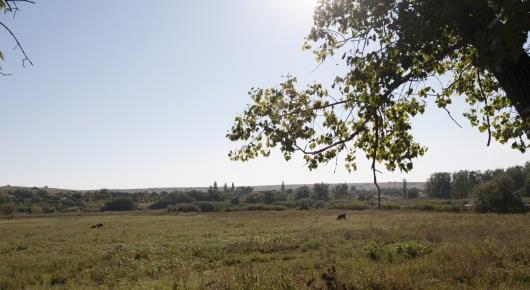Global Environment Facility, FAO have good news for Ukraine forest-steppe

A four-year, US$ 12 million project to benefit Ukraine’s forest-steppe became operational today, with the signing of an agreement by FAO Regional Programme Leader Raimund Jehle and Deputy Minister for Ecology and Natural Resources of Ukraine on European integration Mykola Kuzio. The project is financed in part by the Global Environment Facility, or GEF.
Four years are foreseen to improve the legislative and institutional framework and build a demonstration area of 33 000 hectares that – leading to better and more sustainable management of natural resources in the Ukraine’s forest-steppe zones.
“We have several FAO projects in Europe and Central Asia financed the Global Environment Facility, but this is the first in Ukraine,” said Anastasiya Idrisova, FAO focal point for GEF in Europe and Central Asia. “These concern sustainable forest management, climate change and land degradation. Others are expected to follow, for example in Serbia, Moldova and Uzbekistan.”
“Ukraine should start working on the rehabilitation of peatland areas, development of water reclamation and the use of irrigated lands,” Kuzio said. “I'm sure that this project will help Ukraine to manage all these processes.”
Agriculture dominates the landscape as it covers about 70 percent of the country’s total land area. Forests rank second with 16 percent. Unfortunately, both agricultural and forest areas are degraded, depleted, or even contaminated. Soil erosion by water and wind, acidification and inundation are growing problems caused by inadequate management practices and exacerbated by climate change.
“Agriculture employs 15 percent of the people,” FAO’s Idrisova added. “The project has been designed so that at the end of the day, it will be those people who benefit most from farmland and forests being in better shape.”
Interventions under the project will begin with the critical step of adjusting the legal and institutional framework in favour of sustainable management. This is expected to complement Ukraine’s ongoing effort to achieve a neutral level of land degradation, as envisaged by UN Convention to Combat Desertification.
Another element will be restoration of the productivity and resilience of production landscapes. Climate-smart agricultural practices will be introduced on 29 400 hectares of land. Conservation agriculture will be applied mainly for cereals and oil seeds, and organic farming for potatoes, vegetables and fruit.
Some 90 800 hectares of forest area for wood production should be managed sustainably by 2025, reducing soil erosion problems. Broadleaf trees will be planted on agricultural land to ensure better carbon capture by the soil. Guidelines will be developed for windbreaks – currently unregulated and neglected area. A 3 600-hectare demonstration area will be set up in the forest-steppe zone, providing a wide range of ecosystem services related to regulation of water, pests and disease.
Activities under this FAO project relate to broader global efforts as they contribute to achieving Sustainable Development Goal 15, for “life on land.”
3 October 2017, Kyiv, Ukraine
